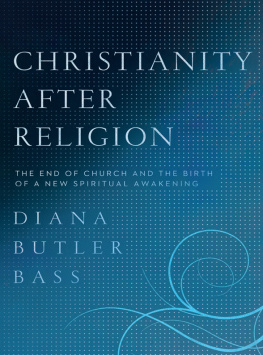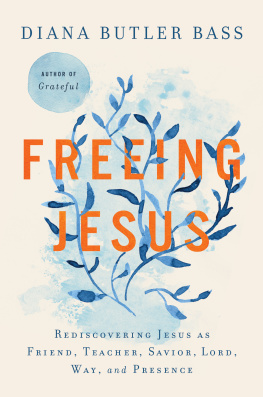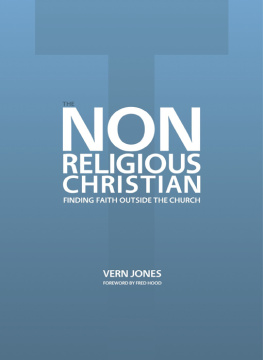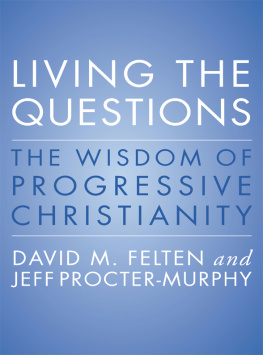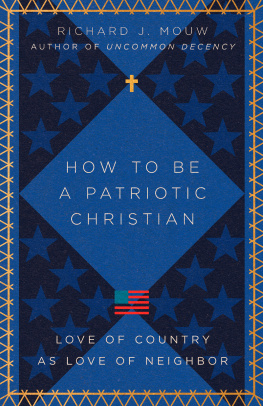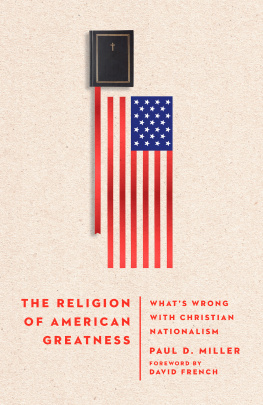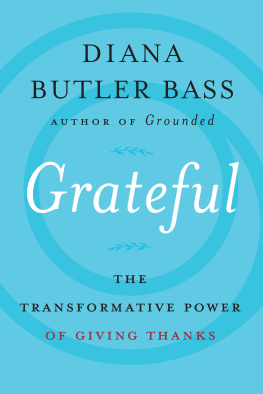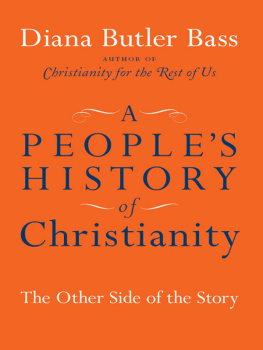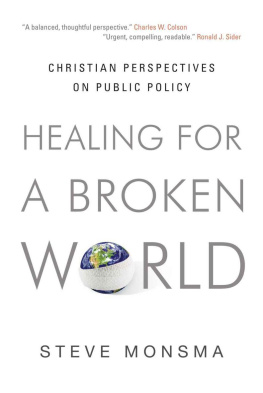Broken
We Kneel
Other Books by Diana Butler Bass:
Strength for the Journey: A Pilgrimage of Faith in Community (Second Edition, Church Publishing Incorporated, 2017)
Standing Against the Whirlwind: Evangelical Episcopalians in 19th Century America
The Practicing Congregation: Imagining a New Old Church
Christianity for the Rest of Us: How the Neighborhood Church is Transforming the Faith
A Peoples History of Christianity: The Other Side of the Story
Christianity After Religion: The End of Church and the Birth of a New Spiritual Awakening
Grounded: Finding God in the WorldA Spiritual Revolution
Grateful: The Subversive Practice of Giving Thanks

Copyright 2004, 2019 by Diana Butler Bass
All rights reserved. No part of this book may be reproduced, stored in a retrieval system, or transmitted in any form or by any means, electronic or mechanical, including photocopying, recording, or otherwise, without the written permission of the publisher.
All biblical quotations are from The New Oxford Annotated Bible, New Revised Standard Edition, Third Edition.
First published in 2004 by Jossey-Bass
A Wiley Imprint
989 Market Street, San Francisco, CA 94103-1741
www.josseybass.com
2019 edition published by
Church Publishing
19 East 34th Street
New York, NY 10016
www.churchpublishing.org
Cover design by Marc Whitaker, MTWdesign
A record of this book is available from the Library of Congress.
ISBN-13: 978-1-64065-101-2 (pbk.)
ISBN-13: 978-1-64065-102-9 (ebook)
To the people of Trinity Episcopal Church,
Santa Barbara, California, especially
Mark Asman, Anne Howard, Ann Jaqua,
Nora Gallagher, and Clark and Terry Roof;
and in memory of two Santa Barbarans
who lived public theology,
the Rt. Rev. George Barrett
and the Hon. Walter H. Capps.
For we look forward to the city
that has foundations,
whose architect and builder is God.
Heb. 11:10
Foreword to the
2019 Edition
A fter August 12, 2017, I was broken into tiny pieces. That date might not ring a bell to you; it is engrained in my memory, much like when John F. Kennedy was shot or when the Challenger exploded. On August 12, we turned our collective consciousness toward Charlottesville and found that hate was personified in a way we hadnt seen in some time. Some would blame the current president and his administration, some would blame white supremacy (both within and outside the administration), some would say there were good people on both sides.
Not long after Charlottesville, I sat with Diana Butler Bass at a caf in Asheville, North Carolina. As we ate our meal, we lamented, we hoped, we reflected on Charlottesville and how our country had reached this point. The book you hold in your hands is a product of lamentation, hope, and reflection. Some of what you read will be from the previous edition that covered the postSeptember 11 reality we lived in and continue to be held in. I was in the third grade when 9/11 happened, and I still remember the horror and bewilderment of the adults in the room. The hushed whispers among the teachers trying to decide if they should clue in a bunch of elementary students on the fact that life had changed in an instant for our country. Then the war came, and frankly, the appalling reality that our nation has spent more than half of my lifetime at war sinks inas if war is an all-too-familiar friend that we have become accustomed to as a welcomed guest during the nightly news.
Deeper than that, since 9/11 and the election of Donald Trump, Christianity continues to be coopted by cultural Evangelicals who wish to take away what seems to some of us to be the very heart and soul of the Christian faith. Ive been fearful for some time that the realities we face will only get darker as time goes on. We have Christians who make excuses for a president who joked about grabbing and assaulting women. We have Christians who make excuses for children in cages. We have Christians who want to take away womens reproductive rights. Oh friends, these are dark times for those who claim the name of Christian, especially in progressive circles.
And then I remember we are a resurrection people. We are a people who believe something so convincing about Jesus Christ that we share it with those around us in our own ways. Its been said before by the Apostle Paul that if this resurrection business isnt real, we are a people most to be pitied.
I dont think were that pitiful. We may be broken, but Diana Butler Bass has taught me we are not a people to be pitied or pandered to. We are more than just a people who have suffered; we are a people who have a strong eternal hope that life can and should be better for all of Gods beloved creation.
In times of crisis, I tend to look for bulwarks of the faith who raise the questions and help discern the answers we need. Diana Butler Bass is a person who stares coopted Christianity in the face and gives us reason to hope. Her work in this book has stood and will continue to stand the test of theological time as a sensible reaction to the problems that plague us.
With most things, we have been fed soft truths and superficial platitudes. This sort of thinking will never accomplish anything, and Diana gives nuance and voice to what many of us are trying to articulate against what seems insurmountable opposition. We are a people who must stand up to racism, warfare, those who deny climate change, and those who hate simply because it seems easier than loving.
As I write, Im in my study with books on the shelves and my dog at my feet. The books I trust most in this life are books that offer concrete ways to address the horrific nature and painful realities our existence faces. Diana Butler Basss books are on that trusted shelf, and I commend this book to you. May it be a baptism of repentance and reckoning with what really matters in this nation. May it give you strength, courage, and fortitude to face the tomorrow our world is about to face. May we kneel, broken yet beautiful, and find God present amid the ashes of our torn-apart world. Because I truly believe in the ashes of Wednesday, we find the hope of Easter Sunday.
The Rev. Robert W. Lee IV, author of
A Sin by Any Other Name
Foreword to the
First Edition
A fter September 11, our nation in its shock and grief launched a war on terrorism marked by an attitude of holy war. Its been good against evil, us against them, and the slogan United We Stand. But for many Christians, it has been a time when we deeply feel the tension between the demands of citizenship and the demands of faith.
American public religion, led by President George W. Bush, interprets our nation as good, pure, innocent, and morally uprightand our enemies as evil. The problem of evil is a classic one in Christian theology and in age-old Western philosophy. Clearly, the reality of evil in the world is real in the biblical worldview. Anybody who could not see the real face of evil in the terrorist attacks of September 11, 2001, is suffering from a bad case of relativism. To fail to speak of evil in the world today is to engage in bad theology. But to speak of they being evil and we being good, that evil is all out there, and that in the warfare between good and evil, others are either with us or against us is also bad theology. A simplistic we are right and they are wrong theology covers over the opportunity for self-reflection and correction. It also covers over the crimes America has committed, which lead to widespread global resentment against us.


